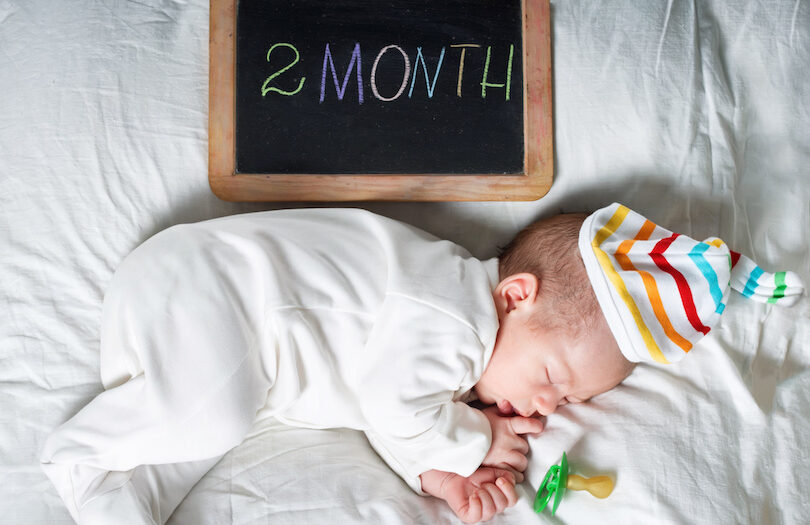By 5 months old, your baby is rapidly developing new skills and becoming more interactive. They are gaining better control over their body movements, showing more curiosity about their surroundings, and communicating more expressively. This is an exciting time as you watch them reach new milestones and continue to grow.
My 5-Month-Old Baby: Growth and Development Milestones
Your baby will be growing and developing rapidly now. They are learning more about the world and how they fit into it. Many of the new things your baby is learning at 5 months are preparing them for eating solid food. It is usually recommended to introduce solids at 6 months, but some babies are ready as early as 4 months. So, if you think it’s time, it’s fine to start trying solids now.
By 5 months, your baby’s weight may have doubled from their weight at birth. They will put on about 550g a month now and grow about 2cm in length. But all babies are different. As long as they keep growing as expected according to their growth chart, don’t worry too much about weight gain and try not to compare your baby with others.
Babies like routine because it makes them feel secure. Remember that the routine you had when your baby was smaller might not work so well now — you will need to adjust it to suit their age.
If you haven’t already done so, now is the time to make sure your home is child-friendly. Your baby will soon be on the move, and ensuring a safe environment is crucial for their exploration and development. Start baby-proofing your home by securing furniture, covering electrical outlets, and removing small objects that could be choking hazards.
Milestones and Abilities: What Your 5-Month-Old Can Do
At 5 months old, your baby is rapidly developing new skills and abilities. They are becoming more aware of their surroundings, more physically active, and starting to show signs of readiness for solid foods. Understanding these milestones can help you support and enjoy this exciting stage of your baby’s growth.
- physical Development. Your 5-month-old baby is quickly gaining strength and coordination. They may soon be able to sit up on their own, and many babies start straightening their backs when held or propped up in a sitting position. While they may be able to sit momentarily without support, always stay close by and surround them with cushions to prevent injury if they fall. During tummy time, your baby will extend their arms and legs, arch their back, and may even push up onto their hands. When lying on their back, they will lift their head and shoulders. They will love bouncing up and down on your lap and can often roll from tummy to back and back to tummy with ease. At this stage, babies explore everything with their mouths and can bring objects to their mouths easily. Even though they might be able to hold a bottle by themselves, it’s best to continue feeding them. They will likely show a growing interest in solid foods, although breast milk or formula should still be their primary diet;
- cognitive Development. Your baby should now be able to swipe at dangling objects with their hands and will shake and examine any toy placed in their hands. They are becoming more curious and can become bored if left alone for too long, signaling their growing need for stimulation and interaction;
- social Development. At 5 months, babies become adept at expressing their needs. They may lift their arms to signal they want to be picked up or cry when you leave the room. They are also starting to recognize familiar faces and may show excitement when they see you;
- emotional Development. Your baby is learning to express a range of emotions. They can laugh, giggle, and show affection by cuddling and kissing you. They are also beginning to understand cause and effect, such as knowing that if they drop a toy, you will pick it up. They may find this game particularly amusing and repeat it often;
- language Development. Your baby is rapidly developing language skills. They may repeat actions like blowing raspberries (sticking their tongue out and blowing bubbles), which is normal behavior. They can recognize different sounds and their sources. This understanding can be helpful for distraction—try jangling a rattle or pressing a squeaky toy to capture their attention if they become fussy in public.
Understanding these developmental milestones can help you support your baby’s growth and enjoy this exciting phase of their life.
As your baby reaches 5 months, they are developing rapidly in physical, cognitive, social, emotional, and language skills. Embrace and enjoy this exciting period of growth and discovery, and continue to support their development with plenty of interaction, play, and love. Your involvement is key to helping them reach their full potential and thrive.
Supporting Your Baby’s Growth: Tips for Development at 5 Months
Supporting your baby’s growth at 5 months involves engaging with them through conversations, play, and interactive activities. This is a crucial period for their physical, cognitive, and emotional development, and providing the right environment and stimulation can help them thrive. Here are some tips to help support your baby’s development at this exciting stage.
- Talk and listen to your baby. Engage in conversations with your baby using various tones and facial expressions, and respond to the sounds they make. This interaction is crucial for helping them understand how conversations work and how to express their feelings.
- Play with your baby as much as you can. Activities such as reading books, singing, tummy time, making funny sounds, and providing them with toys are essential for their development. Pay attention to their cues, as they may sometimes be too tired or hungry to play. Recognizing these cues will help you meet their needs effectively.
- Development problem signs. Babies develop at different rates. However, at 5 months, you should talk to your doctor or maternal child health nurse if they:
- don’t seem to know you or aren’t interested in things around them;
- aren’t making any voice sounds;
- don’t open their fingers, kick their legs, or their legs are bent most of the time;
- don’t follow an object with their eyes or make eye contact;
- don’t turn when you speak to them, or they aren’t startled by a loud noise;
- are unhappy or unsettled most of the time.
- Encourage physical development. Support your baby’s physical growth by offering them various toys to grasp and explore. Encourage tummy time to strengthen their neck and upper body muscles. Ensure your home is baby-proofed, as they will soon become more mobile.
Supporting your baby’s growth at 5 months involves providing a stimulating environment, ensuring proper nutrition, and encouraging physical activity. By engaging with your baby through play, maintaining a balanced diet, and promoting movement, you can foster their cognitive, social, and physical development during this crucial stage.



